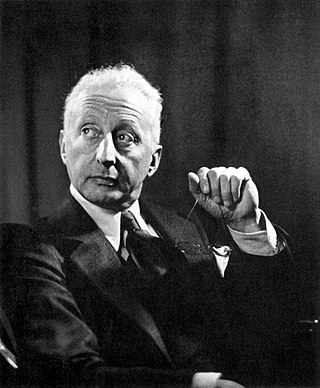
Jerome David Kern was an American composer of musical theatre and popular music. One of the most important American theatre composers of the early 20th century, he wrote more than 700 songs, used in over 100 stage works, including such classics as "Ol' Man River", "Can't Help Lovin' Dat Man", "A Fine Romance", "Smoke Gets in Your Eyes", "The Song Is You", "All the Things You Are", "The Way You Look Tonight" and "Long Ago ". He collaborated with many of the leading librettists and lyricists of his era, including George Grossmith Jr., Guy Bolton, P. G. Wodehouse, Otto Harbach, Oscar Hammerstein II, Dorothy Fields, Johnny Mercer, Ira Gershwin and Yip Harburg.

Guy Reginald Bolton was an Anglo-American playwright and writer of musical comedies. Born in England and educated in France and the US, he trained as an architect but turned to writing. Bolton preferred working in collaboration with others, principally the English writers P. G. Wodehouse and Fred Thompson, with whom he wrote 21 and 14 shows respectively, and the American playwright George Middleton, with whom he wrote ten shows. Among his other collaborators in Britain were George Grossmith Jr., Ian Hay and Weston and Lee. In the US, he worked with George and Ira Gershwin, Kalmar and Ruby and Oscar Hammerstein II.
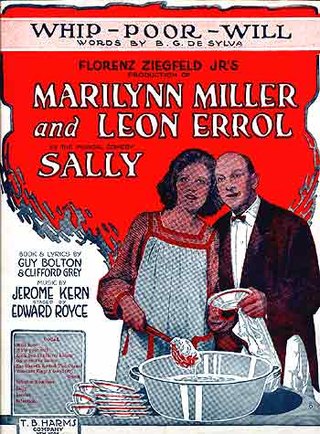
Sally is a musical comedy with music by Jerome Kern, lyrics by Clifford Grey and book by Guy Bolton, with additional lyrics by Buddy De Sylva, Anne Caldwell and P. G. Wodehouse. The plot hinges on a mistaken identity: Sally, a waif, is a dishwasher at the Alley Inn in New York City. She poses as a famous foreign ballerina and rises to fame through joining the Ziegfeld Follies. There is a rags to riches story, a ballet as a centrepiece, and a wedding as a finale. "Look for the Silver Lining" continues to be one of Kern's most familiar songs. The song is lampooned by another song, "Look for a Sky of Blue," in Rick Besoyan's satirical 1959 musical Little Mary Sunshine.
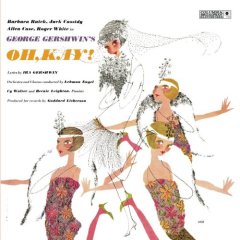
Oh, Kay! is a musical with music by George Gershwin, lyrics by Ira Gershwin, and a book by Guy Bolton and P. G. Wodehouse. It is based on the play La Présidente by Maurice Hennequin and Pierre Veber. The plot revolves around the adventures of the Duke of Durham and his sister, Lady Kay, English bootleggers in Prohibition Era America. Kay finds herself falling in love with a man who seems unavailable. The show is remembered for its enduring song, "Someone to Watch Over Me".

John Leroy "Roy" Atwell was an American actor, comedian and composer, known for playing characters that mis-deliver their lines or stammer, most notably Doc from Walt Disney's Snow White and the Seven Dwarfs.

Félix Marie Henri Tilkin, better known by his pen name Ivan Caryll, was a Belgian-born composer of operettas and Edwardian musical comedies in the English language, who made his career in London and later New York. He composed some forty musical comedies and operettas.

Ivy Sawyer was a British-born American cabaret and ballroom dancer, singer, and stage actress.

Joseph Mansfield Santley was an American actor, singer, dancer, writer, director, and producer of musical theatrical plays motion pictures and television shows. He adopted the stage name of his stepfather, actor Eugene Santley.
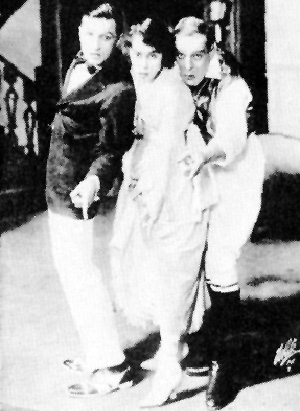
Oh, Boy! is a musical in two acts, with music by Jerome Kern and book and lyrics by Guy Bolton and P. G. Wodehouse. The story concerns befuddled George, who elopes with Lou Ellen, the daughter of Judge Carter. He must win over her parents and his Quaker aunt. His dapper polo champion friend Jim is in love with madcap actress Jackie, but George must hide her while she extricates herself from a scrape with a bumbling constable whom she punched at a party raid.

The Princess Theatre was a joint venture between the Shubert Brothers, producer Ray Comstock, theatrical agent Elisabeth Marbury and actor-director Holbrook Blinn. Built on a narrow slice of land located at 104–106 West 39th Street, just off Sixth Avenue in New York City, and seating just 299 people, it was one of the smallest Broadway theatres when it opened in early 1913. The architect was William A. Swasey, who designed the Winter Garden Theatre two years earlier.

George Grossmith Jr. was an English actor, theatre producer and manager, director, playwright and songwriter, best remembered for his work in and with Edwardian musical comedies. Grossmith was also an important innovator in bringing "cabaret" and "revues" to the London stage. Born in London, he took his first role on the musical stage at the age of 18 in Haste to the Wedding (1892), a West End collaboration between his famous songwriter and actor father and W. S. Gilbert.

Going Up is a musical comedy in three acts with music by Louis Hirsch and book and lyrics by Otto Harbach and James Montgomery. Set in the US city of Lenox, Massachusetts, at the end of World War I, the musical tells the story of a writer turned aviator who wins the hand of the high society girl that he loves by his daring handling of the joystick of a biplane. Popular songs included "Hip Hooray", "If You Look in Her Eyes", "Kiss Me", "Going Up", "Do It for Me", "The Tickle Toe", and "Down! Up! Left! Right!".
Louis Achille Hirsch, also known as Louis A. Hirsch and Lou Hirsch, was an American composer of songs and musicals in the early 20th century.

Oh, Lady! Lady!! is a musical with music by Jerome Kern, a book by Guy Bolton and P. G. Wodehouse and lyrics by Wodehouse. It was written for the Princess Theatre on Broadway, where it played in 1918 and ran for 219 performances. The story concerns an engaged young man, Bill, whose ex-fiancée arrives unexpectedly on his wedding day. Bill works to convince his old flame that he was not worthy to marry her, but his clumsy efforts do not make him look good to his new fiancée, whose mother already dislikes Bill. A couple of crooks cause further complications.

Kissing Time, and an earlier version titled The Girl Behind the Gun, are musical comedies with music by Ivan Caryll, book and lyrics by Guy Bolton and P. G. Wodehouse, and additional lyrics by Clifford Grey. The story is based on the 1910 play, Madame et son Filleul by Maurice Hennequin, Pierre Véber and Henry de Gorsse. The story is set in contemporary France, with a glamorous actress at the centre of a farcical plot of imposture, intrigue and mistaken identity.

Leave It to Jane is a musical in two acts, with music by Jerome Kern and book and lyrics by Guy Bolton and P. G. Wodehouse, based on the 1904 play The College Widow, by George Ade. The story concerns the football rivalry between Atwater College and Bingham College, and satirizes college life in a Midwestern U.S. town. A star halfback, Billy, forsakes his father's alma mater, Bingham, to play at Atwater, to be near the seductive Jane, the daughter of Atwater's president.
Miss 1917 is a musical revue with a book by Guy Bolton and P. G. Wodehouse, music by Victor Herbert, Jerome Kern and others, and lyrics by Harry B. Smith, Otto Harbach, Henry Blossom and others. Made up of a string of vignettes, the show features songs from such musicals as The Wizard of Oz, Three Twins, Babes in Toyland, Ziegfeld Follies and The Belle of New York.
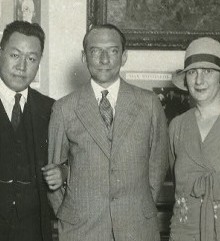
F. Ray Comstock was an American theatrical producer and theater operator. He pioneered the intimate musical comedy, staging several successful comedies at his Princess Theatre in Manhattan. He also produced spectacular musicals, variety shows and serious plays by authors such as Henrik Ibsen and Maxim Gorky.

"Jeeves and the Chump Cyril" is a short story by P. G. Wodehouse, and features the young gentleman Bertie Wooster and his valet Jeeves. The story was published in the Saturday Evening Post in New York in June 1918, and in The Strand Magazine in London in August 1918. It was also included in the 1923 collection The Inimitable Jeeves as two separate chapters, "A Letter of Introduction" and "Startling Dressiness of a Lift Attendant".

















